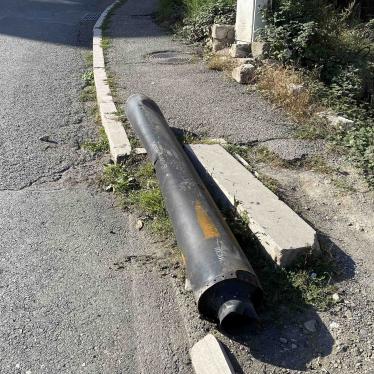- The US policy on cluster munitions is outdated and dangerous.
- Cluster munitions spread bomblets indiscriminately over a wide area, leaving many “duds” that function as landmines and can kill or maim people for years.
- The Biden administration should recognize that cluster munitions have no role in a modern military, revise its current ill-considered policy, and join the treaty that bans their use.
(Washington, DC, September 15, 2021) – The United States government should reject and reverse the ill-considered cluster munition policy directive adopted by the previous administration in 2017, Human Rights Watch said today in releasing the Cluster Munition Monitor 2021 report. The administration of President Joe Biden should commit to joining the treaty banning these unacceptable weapons.
“The US has a terrible history of using cluster munitions around that world and should bring that era to a close,” said Mary Wareham, arms advocacy director at Human Rights Watch and editor of the Cluster Munition Monitor 2021. “The Biden administration has an opportunity to put the US on that path by firmly rejecting cluster munitions.”
Cluster munitions can be fired from the ground by artillery systems, rockets, and projectiles or dropped from aircrafts. They typically disperse in the air, spreading multiple bomblets or submunitions indiscriminately over a wide area. Many fail to explode on initial impact, leaving dangerous duds that can kill and maim, like landmines, for years to come until they are cleared and destroyed.
The current US policy, issued under President Donald Trump in November 2017, replaced a Defense Department policy directive on cluster munitions issued by the George W. Bush administration in July 2008. The 2017 policy abandoned a requirement that by the end of 2018 the US could no longer use notoriously unreliable cluster munitions that result in more than a 1 percent rate of unexploded ordnance.
Instead, it permits the US to use all of the millions of cluster munitions in existing stocks “until sufficient quantities” of “enhanced and more reliable” versions are developed and fielded. It also facilitates US acquisition of cluster munitions from foreign sources to replenish stocks.
The Biden administration has not reviewed or amended the 2017 policy. A recent Congressional Research Service report recommended that the US Congress consider how the 2017 “policy reversal on the military use of cluster munitions will be perceived by the international community.”
The US did not participate, even as an observer, in the 2007-2008 Oslo Process that resulted in the Convention on Cluster Munitions, which comprehensively bans cluster munitions, requires clearance of cluster munitions remnants within 10 years, and directs assistance to victims.
The 110 states parties to the treaty and 13 countries that have signed include 24 NATO member states and allies such as Australia and Japan. Countries that have suffered from US use of cluster munitions in the past such as Afghanistan, Bosnia and Herzegovina, Iraq, Laos, and Lebanon, are treaty members.
The Cluster Munition Monitor report tracks adherence to the Convention on Cluster Munitions by all countries. It finds that the United States no longer produces cluster munitions, but has not committed to never producing them in the future. China and Russia are actively researching and developing new types of cluster munitions.
The last US use of cluster munitions was during Operation Iraqi Freedom in 2003, with the exception of a single attack in Yemen in December 2009. The Obama administration suspended US cluster munition deliveries to Saudi Arabia in 2016 after evidence emerged of civilian harm from cluster munitions used by a Saudi-led coalition operation in Yemen.
US Senators Patrick Leahy, Dianne Feinstein, and others have introduced legislation over the past decade encouraging the US to ratify the Convention on Cluster Munitions. The US wing of the Cluster Munition Coalition, coordinated by the disability rights group Humanity and Inclusion (formerly Handicap International), has urged the US to change course on cluster munitions and join the growing global opposition to these weapons.
Cluster Munition Monitor 2021 is the twelfth annual report by the Cluster Munition Coalition, the global coalition of nongovernmental organizations co-founded and chaired by Human Rights Watch. The report will be presented to states attending the second part of the convention’s Second Review Conference in Geneva on September 20-21.
“The US should show other countries around the world that it recognizes the importance of protecting civilians in conflict zones from the lasting harm and danger of cluster munitions,” Wareham said. “The Biden administration should recognize that cluster munitions have no role in a modern military and reverse the 2017 policy.”









